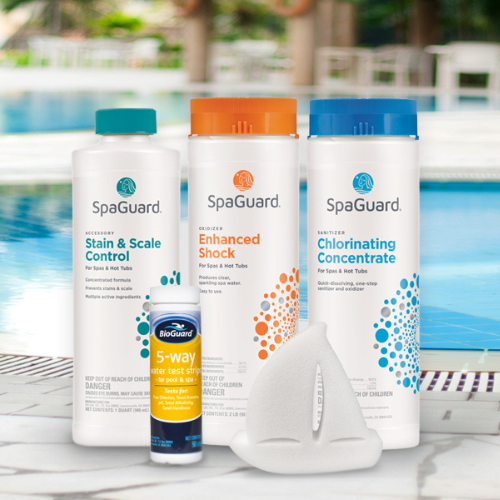Can I use all-natural materials (like baking soda) to treat my water? is one of the most often asked questions by both novice hot tub/swim spa owners and seasoned pros. Our staff members at Isaacs Pools and Spas and Bullfrog Spas of Tri-Cities collectively have more than 250 years of experience. everything from sales to service to water chemistry.
We are aware that the chemicals for hot tubs and swim spas are expensive, thus people are constantly seeking “hot tub hacks” to avoid spending money on chemicals and racing to the shop! People also prefer a more “natural” approach since they don’t want their health and wellness to be negatively impacted by harsh chemicals. We are aware of your worries, and we want to be able to explain to you why and how these goods are crucial—not just for you, but also for the longevity of your hot tub or swim spa.
We are not the Hot Tub police but let’s talk about chemistry.
Clorox (liquid bleach)
To be Soak Safe for use, your hot tub or swim spa must include a sanitizer to kill bacteria. Using liquid bleach (Clorox) or even pool liquid chlorine in place of chlorine/bromine hot tub chemicals is a common household product substitution. Chlorine has very little to no disinfection power once it is in solution (like Bleach). The only use for it is bleaching. You cannot properly disinfect your water with liquid bleach.
The use of Clorox liquid bleach for purposes other than those intended is actually prohibited because it is an unstable product with a high pH of 13, requires frequent addition, bleaches out swimwear, and causes a quick increase in TDS.
The EPA has cleared sodium dichloroisosyanurat (also known as dichlor or sodium dichlor) for use in swim spas and hot tubs. Only use dry chlorine, and make sure to utilize sodium DiChlor instead of calcium hypochlorite or sodium hypochlorite in the formula.
Baking Soda
Your hot tub’s plumbing and equipment needs to be protected from a quick pH shift in the water, for the sanitizers to function properly, to increase swimmer and soaker comfort, and to maintain the proper pH and alkalinity. Sodium hydrogen carbonate serves as the major component of Spa Guard Total Alkalinity Increaser and SpaGaurd pH Increaser. Sodium bicarbonate is what makes baking soda. Baking soda and pH increaser both include chemicals that are extremely similar. Simply said, hydrogen has been added to baking soda. Our experts advise against using baking soda as a substitute. For the system to function properly and to keep your water safe over the long run, pH chemicals are used. Making sure you view it as a temporary solution rather than something you can replace anytime you feel like it is crucial.
Ask yourself, Do you want to substitute baking soda with hot tub pH increaser in your baked goods?
The “Magic Eraser” Hack.
Instead of purchasing a large sponge to absorb additional oils and biofilm, many users have turned to the magic eraser hack to control algae, scum, and biofilm. The magic eraser partially solves the issue, but it doesn’t fix it. You must keep in mind that additives like sodium bisulfite, formaldehyde, and melamine are also included in magic erasers. Melamine is the component of greatest concern. When melamine is added to a sanitizer that contains CYAs, a dangerous byproduct known as melamine cyanurate may result. Even the magic eraser manufacturer advises against using this product in hot tubs, swim spas, or swimming pools. The components in the eraser may react or interfere with any form of chlorine product.
Scum and biofilm can be significantly decreased by keeping impurities out of the water by doing an additional rise cycle in your suits, washing off, and avoiding adding body cosmetics. Additionally, we advise including a scum sponge to assist gather and trap any extra oils in your water.













